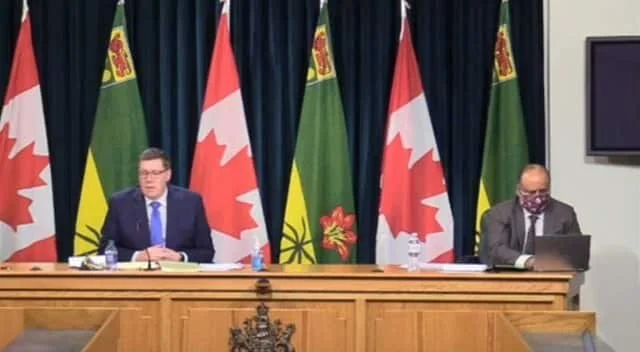When long-term care residents and staff are fully vaccinated, when will restrictions lift?
By Brian Zinchuk, Local Journalism Initiative reporter
REGINA – Saskatchewan, and Canada as a whole, is seeing hiccups in what are still early days of the COVID-19 vaccination rollout. On Jan. 19, the federal government explained that it would not be receiving any of the Pfizer vaccine the following week, for instance. The New Democratic Party pointed out a Regina facility didn’t have enough vaccine for all its assisted-care clients in addition to its long-term care clients on Jan. 18. But eventually, the residents and staff of long-term care facilities, the provinces’ highest priority for the vaccine distribution, will be fully vaccinated. Will we see restrictions start to lift for those people, or will they have to wait six months?
At the regular COVID-19 briefing on Jan. 19 in the Legislature, both Premier Scott Moe and chief medical health officer Dr. Saqib Shahab replied. Shahab said, “I think that’s really important.”
“The main thing, right now we have been very cautious because the vaccination rate is coming up very slowly. And as you know, in the clinical trials the vaccines had 95 per cent effectiveness, but in the real world we do know that if you're elderly, have immune suppression, the vaccine may not be that effective and COVID is so highly transmissible that, even if you have a long term care facility where you, for example, have a 90 per cent uptake of the vaccine, and the vaccine is 90 per cent effective that still leaves you a significant proportion of the long-term care residents still susceptible to COVID.
“So, I think at the present time, it is very important that as our vaccination picks up, we adhere to all public health measures. Once we have the vast majority of the population vaccinated, especially adults with that underlying risk factors, but also broadly all adults, I think then we can cautiously start looking at how we relax our public health measures over the summer, likely that will start happening.
“And again, I think it remains important. Right now, Obviously, there's no vaccine amount, high demand especially for the most vulnerable. I think once we have a large amount of vaccine available in the summer, we need to make sure that those of us who, if COVID so even low in the summer, all of us think of getting vaccinated. Well, that is one way how we can you know come out of most of restrictionns that we currently face, by fall.
Shahab added, “But I think, right now, we really have to, even after getting vaccinated, we do have to comply with all public health measures, because not everyone is fully protected by the vaccine, and we're understanding more about how the immunization affects not just clinical illness, which it does protect to a large extent, but also transmissibility. But as we get more data from Canada, from our own province, and from other countries, you know, we'll be updating guidelines that but that likely won't change. Then at least May, June, once we have the majority of the population, especially the most vulnerable fully immunized.
Moe said it ties into hospitalizations, and it is still a couple months early for this discussion.
“But the fact of the matter is, as we are able to access vaccines for the most vulnerable in our population, the elderly in our population, and start creeping those vaccines and the availability of those vaccines down through the age groups in society, it does beg the question on when will we be able to start to look at relaxing the measures that we have in place; the very, very significant measures that we have in place here in Saskatchewan.”
He continued, “I would point back to the conversation we had about hospitalizations and as we start to hopefully, if you look at our hospitalizations, quite often the age of the of the folks in hospital are somewhat younger than what we might have in our long-term care facilities. And so, as we work our way through the age groups, and we start to see our hospitalizations decreasing in significant fashion, that would speak to the fact that we have many of those that are more vulnerable in our community receiving the vaccine and not contracting COVID-19, and not as a point, I think, when we could have a little more open conversation about what the future looks like for Saskatchewan.
“So two things on that: that isn't in the in the next number of weeks, that will be the next number of months. And this speaks to the importance of us, as Canadians and us, looking to our Canadian government to do everything they can to procure as many vaccines as they can, and to do so in as the shortest timeframe as possible.
“I think premier Ford and made some comments today about what he would urge the prime minister to do and that was to find, I believe, someone, if not the CEO of Pfizer, and maybe light a firecracker up his yin yang, I think was the words that I heard. And I, I would just say, that there would be a lineup of premiers behind that the prime minister was able to do that; there would be a lineup of premiers behind that would bring a lighter to that party.”
Photo: Premier Scott Moe, left, and Dr. Saqib Shahab responded to a question about lifting of restrictions as immunization progresses. Screen capture courtesy Government of Saskatchewan Facebook page

